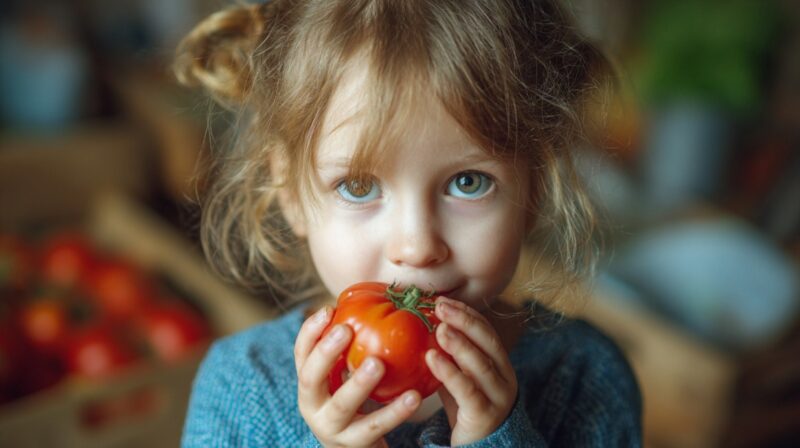How to Raise a Vegan Kid in the US (Common Questions Answered)
Vegan parenting in the United States has been gaining attention as more families decide to raise their children on plant-based diets. Public discussions often highlight both the benefits and the controversies surrounding raising vegan children.
Some parents turn to this choice for ethical reasons, others for health, and some for both. However, critics often question whether children can thrive without animal products.
A major goal of this guide is to clear up misconceptions, provide real-world advice, and bring together balanced perspectives. Parents deserve accurate information and practical strategies to help them make confident, informed decisions for their children.
Common Questions Parents Face & How to Answer Them

Parents raising vegan children often face recurring questions that come from relatives, friends, and even strangers. These questions usually come out of concern, but sometimes they reflect misinformation or cultural habits.
Having clear, calm, and thoughtful responses not only helps reduce tension but also strengthens a parent’s confidence in their choices.
Is It Safe to Raise a Vegan Kid?
Safety concerns are often the first topic that comes up when people hear about vegan parenting. Parents naturally want to make sure their children receive everything required for healthy growth.
Fortunately, research shows that well-planned vegan diets can provide all essential nutrients across every stage of life, including infancy, childhood, and adolescence.
Balanced plant-based eating provides protein, carbohydrates, healthy fats, vitamins, and minerals when meals are structured with variety in mind.
Nutrient-dense foods like beans, lentils, tofu, leafy greens, whole grains, nuts, seeds, and fortified products form the building blocks of a strong diet.
Professional health organizations around the world recognize vegan diets as safe when properly designed.
Misconceptions about stunted growth, weak bones, or poor immunity are often rooted in sensational stories that overlook proper meal planning. Parents who remain informed and proactive can ensure their children thrive.
Regular pediatric check-ups and occasional blood tests help confirm that development is on track.
- Plan meals with variety, covering proteins, fats, and micronutrients.
- Monitor intake of key nutrients such as iron, calcium, zinc, iodine, B12, D, and omega-3s.
- Use pediatric evaluations and growth charts for reassurance.
- Consider supplementation as a normal and supportive tool.
Transitioning Kids to a Vegan Diet
Every family approaches the transition differently, and no single method works for everyone.
Some parents prefer a gradual reduction of animal products, while others switch to vegan meals more quickly. Both approaches can be successful depending on the child’s temperament and the household’s comfort level.
Involving children in the process increases enthusiasm and cooperation. Letting kids help with grocery shopping, picking recipes, or preparing meals creates a sense of ownership. Food exploration becomes less about restriction and more about discovery.
Children often enjoy experimenting with new flavors when they feel engaged.
Parents in mixed-diet households face extra challenges, but success is possible by preparing flexible meals. A family dinner might include a base dish like pasta, rice, or tacos, with plant-based proteins for vegan members and other options for those who eat meat.
Respecting differences while maintaining unity at the table helps children adjust smoothly.

- Start with familiar meals and swap animal products for plant-based versions.
- Introduce new foods gradually while maintaining variety.
- Allow children to participate in shopping and cooking.
- Share success stories with other families to build encouragement.
Social & Emotional Aspects of Raising Vegan Kids
Social settings often present challenges for vegan children, especially when surrounded by peers with different eating habits.
At school lunches, birthday parties, or family gatherings, children may feel singled out or face curiosity about their diet. Preparing them with confidence and communication skills turns those moments into learning opportunities rather than sources of stress.
A vegan upbringing often fosters empathy toward animals and the environment, along with a sense of personal responsibility.
Parents can nurture these qualities by having open conversations about values and by supporting children when they encounter questions or teasing. Encouraging kids to explain their food choices in age-appropriate ways helps them feel secure in their identity.
Emotional support at home strengthens resilience. When children know their parents respect their feelings and provide guidance, they develop the confidence to face outside challenges.
Rather than seeing themselves as excluded, vegan children can feel empowered to represent their family’s values.
- Teach kids to respond to questions with calm, confident answers.
- Provide alternatives for school lunches, parties, and events.
- Encourage open conversations about feelings related to being different.
- Reinforce values of kindness, empathy, and respect for others’ choices.
Dealing with Criticism from Family & Friends

Parents raising vegan children often encounter skepticism or direct criticism from relatives and friends. Concerns may be expressed out of love, but sometimes resistance comes from deeply ingrained habits and cultural norms.
- Patience
- Confidence
- Firm boundaries
Calm responses rooted in facts are more effective than defensive arguments. Sharing reliable resources, discussing supplementation openly, or showing pediatric growth results helps address concerns with evidence. Over time, consistent reassurance often reduces tension.
Boundaries may be necessary when criticism becomes repetitive or undermines parental authority. Parents have the right to raise children in ways that reflect their values, and protecting a child’s emotional well-being takes priority.
A child who grows up healthy and confident becomes living proof of the success of the approach.
View this post on Instagram
- Respond with facts instead of defensiveness.
- Share pediatric reports or trusted resources.
- Acknowledge concerns but set clear boundaries.
- Focus on your child’s well-being as the best evidence.
Final Words of Encouragement
Raising vegan children requires effort, planning, and patience, but the rewards can be profound. Parents who commit to informed and thoughtful approaches nurture not only physical health but also compassion, confidence, and ethical awareness.
Support networks of vegan families, online communities, and medical professionals are expanding, offering encouragement and resources. Love, consistency, and care remain at the core of good parenting, regardless of dietary choices.
Families can feel reassured that with proper planning, vegan kids can thrive and grow into healthy, confident individuals.
Read more: Here are some of the simplest dairy-free and vegan snack ideas for your kids. They can bring it to school or snack on them at home!
Hello, my name is Marina Vlasov. Im currently trying to change my career from my current job to becoming a chef. It is a hard road, but I feel like im coming there soon. While I enjoy preparing practically all food, from various cuisines from all over the globe, I must say that I mostly enjoy preparing vegan food. That is my strongest side. That is why I want to provide you with the best vegan food recipes on this blog of mine.

